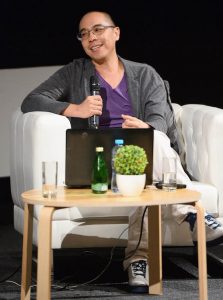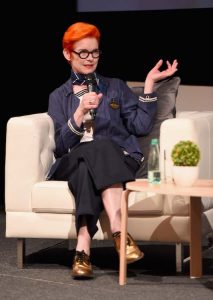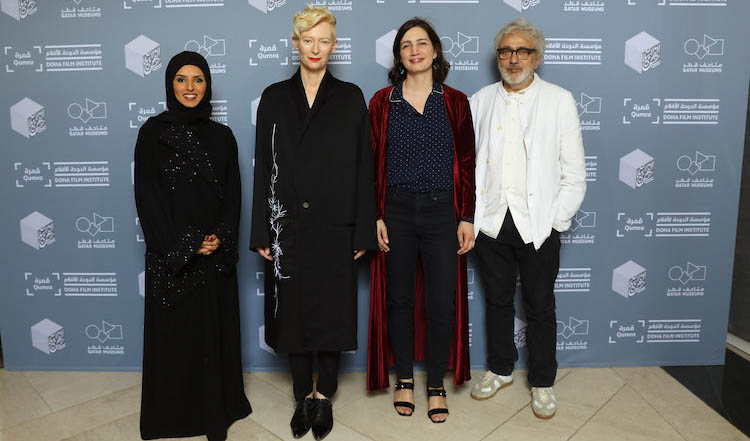The fourth edition of Qumra, the annual event organised by the Doha Film Institute (DFI), brought together more than 150 acclaimed filmmakers, industry professionals and experts to nurture 34 films – the Qumra Projects – by first and second-time filmmakers from 25 countries that are in various stages of development.
The six-day event is currently ongoing at Souq Waqif and the Museum of Islamic Art until this Wednesday, 14 March.
No Middle Ground
Three film industry leaders advises young filmmakers to be ‘courageous, daring, vulnerable and authentic’.
Toronto International Film Festival Artistic Director Cameron Bailey; Christophe Leparc, Managing Director of the Director’s Fortnight at Festival de Cannes; and Bero Beyer, Festival Director of the International Film Festival Rotterdam, were unequivocal in their observation that Qumra has evolved significantly in the past three years.
Beyer said it is not easy to develop the courage and vulnerability to be honest as filmmakers. He said that being rooted in your milieu and being honest about it, you make yourself vulnerable as a filmmaker. But then, your film becomes interesting. He said that at Rotterdam, they focus on the avant-garde and never on anything that is middle-ground.
Leparc, now in his fourth visit to Qumra, said he sees projects here that deal with subjects he is looking for. He said that the talents here are not immature anymore – and that it’s great to see DFI help them make ‘real’ films. Leparc also pointed out that young talents must explore their deep roots but to not focus on being ‘too exotic’ with their stories, adding that the universality of cinema always comes from local roots.
Bailey meanwhile emphasised the need for young filmmakers to tell stories rooted in their milieu because that is what people want to see – real stories of real people.
Brigitte Lacombe
In an inspiring presentation that featured mesmersising photographs of celebrities, acclaimed photographer Brigitte Lacombe took audiences through the story behind the portraits.
Lacombe was also joined on stage by her sister, renowned documentary filmmaker Marian Lacombe, and together, they also presented two of the illustrious projects championed by Qatar – I am Film, a visual archive of filmmaking talent from the Arab world and beyond, and Hey’Ya: Arab Women in Sport, an inspiring take on the female athletes from the region.
Qumra Masters
Tilda Swinton
Candour, character and charisma – three words sum up the two-hour-long witty, intense and unpretentious Masterclass by Qumra Master Tilda Swinton in Doha. Addressing a packed audience of new talents and film-lovers, Swinton was authentic and thoroughly charming, as she spoke of her 30-year career.
The Masterclass by Swinton could not have been more befitting as her experiences in cinema offered a perfect inspirational plank. Swinton, who is co-writing her next film in which she ‘may or may not act’, said performing is her way of writing.
The real magic, for her, then is to perform with really communicative filmmakers. Swinton said she is not trained in acting and is much more interested in filmmaking. She needs to know the ‘collaborators’ and that is why she insists on meeting the filmmaker before she commits to a project.
Qumra Master Gianfranco Rosi
Qumra Master Gianfranco Rosi, the only documentary director to win the Berlinale Golden Bear, is normally reticent about discussing his ‘next’ project. That is not only because his approach to documentary film is to evaluate any given subject with the most minimal pre-formed opinion but also because he needs to find that ‘honest structure’ of the tale before he can commence work.
Rosi’s next work, Notturno, gives a peak into the night life in the Middle East and marks his first documentary in the region, having taken his camera to India, USA, Rome and the island of Lampedusa, winning acclaim along the way. With the new documentary, he plans to take a closer look at ‘borders betrayed by history’ and how ‘borders have changed the destiny of people’.
In the subjects he chooses and how he adapts them for the art of documentary, there is also a lesson for young filmmaking talents – a thumb-rule that would apply for features as well as documentaries and shorts. It is about the ‘idea of structure,’ which evolves as Rosi said, ‘by countering people and going deep into the reality to find that one narrative element’ that will hold together the movie.
Everything starts with an encounter, according to Rosi, during his Qumra Masterclass. He said he doesn’t go deep initially, but when he hits upon the narrative structure, he makes sure that everything is linked, from the first frame to the last edit.
Qumra Master Apichatpong Weerasethakul
 Cannes Palme d’Or winning Thai filmmaker and visual artist Apichatpong Weerasethakul presented a compelling notion before his audience of young filmmakers during his Qumra masterclass: The distant possibility of hooking up all the brains in the world to share their dreams. We will no longer need cinema then, he said, underpinning his own meditative approach to film as a medium that is ‘evolved from dreams’.
Cannes Palme d’Or winning Thai filmmaker and visual artist Apichatpong Weerasethakul presented a compelling notion before his audience of young filmmakers during his Qumra masterclass: The distant possibility of hooking up all the brains in the world to share their dreams. We will no longer need cinema then, he said, underpinning his own meditative approach to film as a medium that is ‘evolved from dreams’.
Weerasethakul’s masterclass was anything but ordinary, as he took audiences on his very original journey in cinema, shaped by the collective memory of his own and his friends, and shaped from their many dreams. He connected dreams to movies, reminding audiences of the four cycles of the brain while one is at sleep, and concluding that ‘movies evolved from this’.
The young Thai director studied architecture because his hometown did not have a film school, but film remained his first love. His films are linked to dreams, memories, experiences of loved ones. He said he prefers to work on cameras that only shoot in 2K but is forced now to go for 4K. He said he selects his actors by going out to the street with flyers, and often makes changes to characters and their backgrounds in the films to suit the actors he chose. He also doesn’t seek out music for his movies, and whatever music that forms part of his films, come from the ‘memory of the shoot’.
Qumra Master Bennett Miller
 Oscar nominated director Bennett Miller encouraged first- and second-time filmmakers to equip themselves with resilience when making films and remain true to their vision.
Oscar nominated director Bennett Miller encouraged first- and second-time filmmakers to equip themselves with resilience when making films and remain true to their vision.
He said he dropped out of school, worked for a filmmaker, got fired, was hurt, assisted on a music video, and ended doing very lowly work for many years.
It reached a point where it occurred to me that I was incredibly unhappy doing this. I was following that 12-year-old kid (in himself) who had this fascination for the moving image. I made a decision to stop, and at that very minute, felt the relief of letting go of my ambition and wanting to do film, as if something clicked.’
He then started filming the documentary about Timothy Levitch, ‘a poetic soul living in a different era and very performative’. He was a one-man-crew, and shot for 77 hours, which he didn’t find ‘interesting or soulful’ enough. He started afresh, and shot another 100 hours of Timothy.
The final product, after four years of effort, was rejected by every festival until ‘a friend of a friend’ formed an emotional reaction to it. She was then programming for a Los Angeles film festival and entered the film, titled The Cruise as her fee. It was one of the press screenings and The Cruise received tremendous media acclaim.
Miller said he had never felt the same sense of gratification with any other film than when watching The Cruise projected on the big screen with an audience. He said that it was such a transcendental experience. His lesson then for young filmmakers: Do not wait for approvals; it won’t happen. Follow your vision of what you want to do, and don’t give up on what you are doing.
Qumra Master Andrey Zvyagintsev
 Russian director and writer Andrey Zvyagintsev shared an inspiring story that chronicled his entry into films and his transformation as one of the world’s modern masters with an inimitable style and approach to cinema. Zvyagintsev said he ventured into cinema with no formal training.
Russian director and writer Andrey Zvyagintsev shared an inspiring story that chronicled his entry into films and his transformation as one of the world’s modern masters with an inimitable style and approach to cinema. Zvyagintsev said he ventured into cinema with no formal training.
My way of studying cinema was by watching films. I would immerse myself in cinema – it was just the movies and I, and no mentors in between.’
Zvyagintsev said he does not keep in mind international audiences or how they relate to his characters or their action when he makes his films. Citing one of his films, Loveless, he said that in Russia, most of the audience denied any relationship with the characters.
They said the characters were monsters and had nothing to do with them.’
He creates films that be believes in, mostly created from his observations, and his passion for arts and literature.
Literature helps you build the narrative; art gives you great composition – and in the realisation that there are going to be challenges along the way. There is no set recipe for success. There are going to be difficulties. But when you discover your inner voice, you get past them.’
Qumra Master Sandy Powell
 Moderated by Richard Pena, the Sandy Powell masterclass was highlighted by show-reels of the British costume designer’s masterful works that brings out her versatility and ingenuity as one of the world’s renowned costumed designers.
Moderated by Richard Pena, the Sandy Powell masterclass was highlighted by show-reels of the British costume designer’s masterful works that brings out her versatility and ingenuity as one of the world’s renowned costumed designers.
With an accomplished ouvre that includes several period films, fairytales and historic set-pieces such as Orlando, Shakespeare in Love, Gangs of New York, The Aviator, Hugo, and Cinderella, Powell said that while it is important to work with the team, she also goes by her instinct and intuitive understanding of the character.
She said she is not overly attracted to working in science fiction films because ‘she is not attracted to them’, adding that she’s not interested in creatures, aliens, and superheroes. She has taken delight in doing independent, low budget films because ‘they push you creatively’ to work within the resources. Her advice, from her personal experience as costume designer: ‘work instinctively not intellectually’.
Visit the DFI website for more information.







